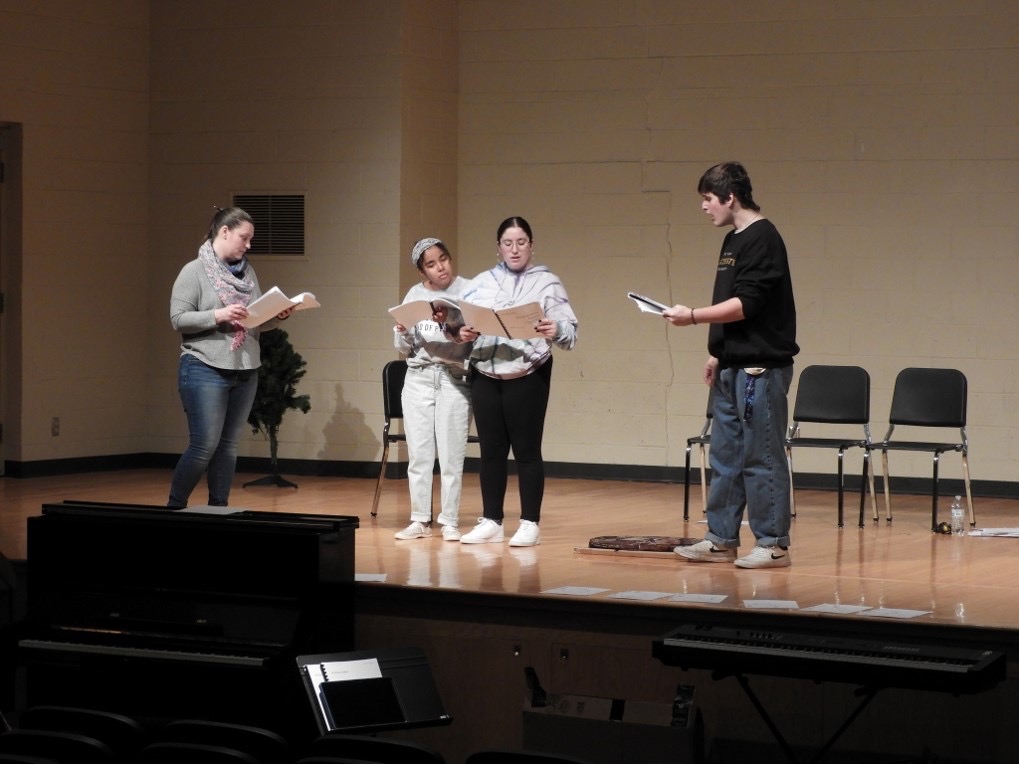 Students practice opera in the Wine Recital Hall.
Students practice opera in the Wine Recital Hall.
Photo provided by Braydon Hoggatt
Students Reflect on Directing ‘An Opera Sampler’
Alyx Buffenbarger
On Saturday, February 4, Opera workshop students from the university and the North Manchester community performed selections from three operas that they had been putting together for over a month. And next to the opera director, Dr. Debra Lynn, Director of Choral Organizations and Vocal Studies, stood her student assistants, James Walsh and Justin Szelis. The two English education students originally took up this opportunity to fulfill their directing class requirements, but they also learned things about operas and made great memories.
In an interview, James Walsh discussed how the students tackled three separate operas. “Justin was assigned to do one long opera and I was assigned the two shorter ones,” Walsh explained. “I was in charge of ‘Hansel and Gretel’ and ‘Pompeia.’ They had cool, colorful sets and funny actors.”
Indeed, Walsh had considerable admiration for his peer’s quick learning and directing skill. “Justin had a much harder assignment than I did,” he said. Szelis oversaw one longer opera that was much more elaborate. “His [opera] had 30 actors and I have no idea how he kept that straight.”
Lynn, in an email interview, was pleased with both students’ efforts. “James and Justin did a great job,” she said. “They were very detailed and helpful.”
Walsh said that one of the hardest challenges he faced was the opera “supertitles.” These are captions, specifically in opera, that translate the songs being sung into words for the audience to read. This is done because opera is known for being difficult to understand yet still beautiful.
“It’s very hard to run supertitles if you can’t read music, so it was a big responsibility for these guys,” Lynn said. “They were real champs and caught on very fast.”
Walsh oversaw the supertitles of Szelis’s opera. “There was one part in ‘Strawberry Fields’ where all 30 actors are singing at once,” he recalled. “The first show I got completely lost and was scrambling to put anything sensical on the screen. The second show I got better at it, and by the third show I aced it.”
He went on to explain how much time was put into creating the show and how he grew to have a better appreciation for the art. “There were about 12 rehearsals overall,” Walsh said. “Each one lasted about an hour and a half.” These rehearsals began in January and ended in the beginning of February when the official performance finally took place.
“Opera is very impressive,” Walsh said. “Even I could tell that it took so much work to put together.” He spoke very highly of many peers that he worked beside and was thoroughly impressed by the skills that he witnessed in the time it took to create the show.
The directing experience was not all work, though. “Justin and I found a remote in the back that was used for the projector, and it had a laser pointer on it,” Walsh began to mischievously recount, “so a huge game for us was seeing how long we could go with shining the laser pointer at the stage without anyone noticing.” He smiled as he remembered the funny moments shared with his friend. “If you put this in this article and they read it, that’s what we were doing the entire time. They would never know. I would just randomly shine it on people’s foreheads when no one was looking.” Supposedly, the opera cast was unaware of this endeavor.
Walsh feels an immense amount of gratitude for Lynn. “I want to show my appreciation for Debra for letting us do this,” he said. She orchestrated the extra class for James and Justin since there wasn’t another option to complete this credit.
“My creative solution was to basically have them shadow me and serve as assistant directors for the opera,” Lynn stated.
The two share an appreciation for each other since they were able to get what they needed from this opportunity. “I really appreciate her taking the time and letting us go in there and work to get the credit done,” Walsh said.
On the other hand, Lynn said: “I really enjoyed getting to know then a bit. I hope I have a chance take them out for a celebratory dinner at some point before they graduate.”
The Opera workshop offers Manchester an extraordinary opportunity to experience a fine art that’s usually reserved for a large university or city. “People have to seek out opera here,” Lynn said. “They won’t do that unless they understand it as a viable artform that offers deeper meaning and richer storytelling than a cartoon.”